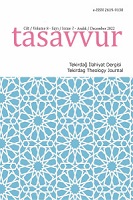Habeş Yahudiliği: Falaşa Keşişler ve Habeş Hristiyanlığı Üzerinden Habeş Yahudiliğinin Nasıl Oluştuğuna Dair Bir Değerlendirme
Abyssinian Judaism: An Evaluation of How Abyssinian Judaism Formed through the Falasha Monks and Abyssinian Christianity
Author(s): Neslihan KURANSubject(s): Jewish Thought and Philosophy, History of Judaism, Sociology of Religion, History of Religion
Published by: Tekirdağ Namık Kemal Üniversitesi İlahiyat Fakültesi
Keywords: Abyssinia; Beta Israel; Falasha; Jewish-Christianity; Ark of the Covenant; Solomon’s Temple; Kebra Nagast;
Summary/Abstract: It is rather difficult to detail the history of Abyssinian Judaism. Although there is no clear information on the subject, the existence of a Jewish ethnic group in Abyssinia is generally explained as the result of contact with members of the ancient Jewish community. Recent research point out a much more different and complex picture of Judaism in Abyssinia. First of all, it is important to know that in the early stages of Abyssinia, an ethnically and religiously differentiated (distinguishable) Jewish community has yet been encountered. What should be questioned in the study of Abyssinian Judaism is the Ethiopian Orthodox Tawhid Church (Abyssinian Orthodox Church) itself, which for many years served as a vehicle for transmitting Hebrew elements. In that sense Abyssinian Orthodox Christianity offers one of the most unique expressions of world Christianity; is still observing the Sabbath and still continuing to circumcise boys. Moreover, it maintains the belief that the Ark of the Covenant was brought to Ethiopia before the destruction of the Solomon’s Temple. If Abyssinian Christianity which has a Judeo-Christian tradition is to be ignored and a separate history of Abyssinian Judaism (as a community) is to be established with evidence, it is understood that the starting point could be after the 14th century. The claim of the study is that the formation process of Abyssinian Judaism may have been a development formed by Abyssinia's own choice with the acceptance of Christianity rather than a direct continuation of a Jewish group. The weight of Jewish influence in the Falasha community, which is claimed to be the present representative of Abyssinian Judaism, is related to the orientation of the local monks after the 15th century and the result of the texts they convey (transfer). When the ethnic and religious positions of the Falashas are evaluated objectively, the Falashas are directly embedded in the JudeoChristian tradition of Abyssinia. Therefore, it is understood that Falashas can not be held responsible for Jewish influence in the face of Abyssinian Christianity which has followed a Judeo-Christian tradition for many years.
Journal: Tasavvur Tekirdağ İlahiyat Dergisi
- Issue Year: 8/2022
- Issue No: 2
- Page Range: 1275-1300
- Page Count: 26
- Language: Turkish

